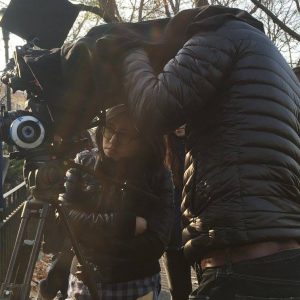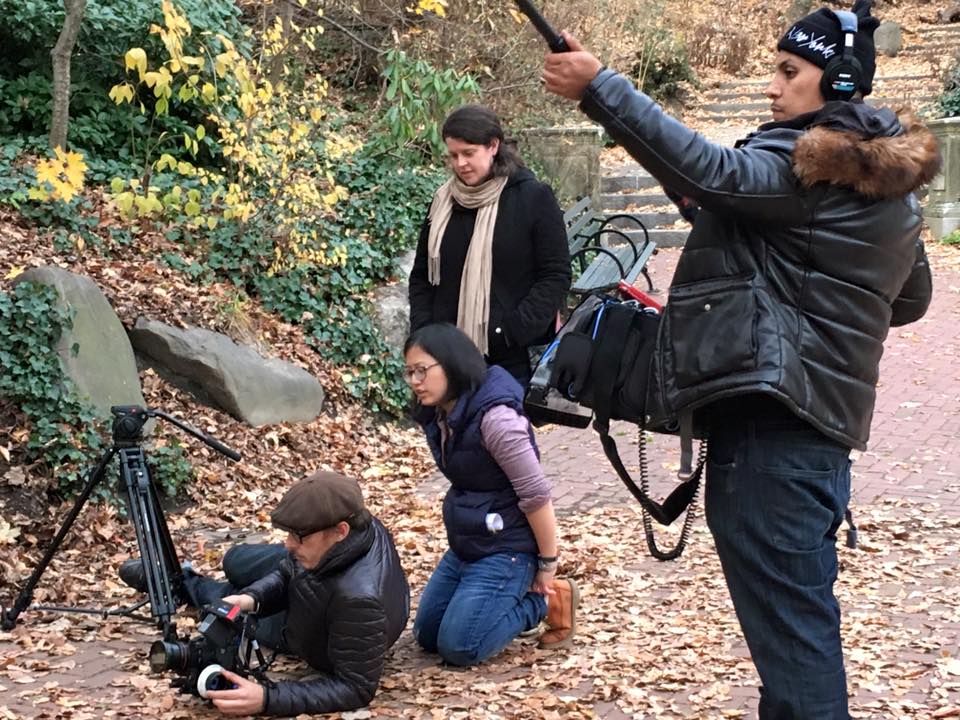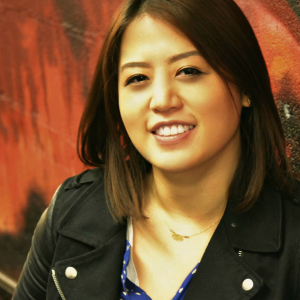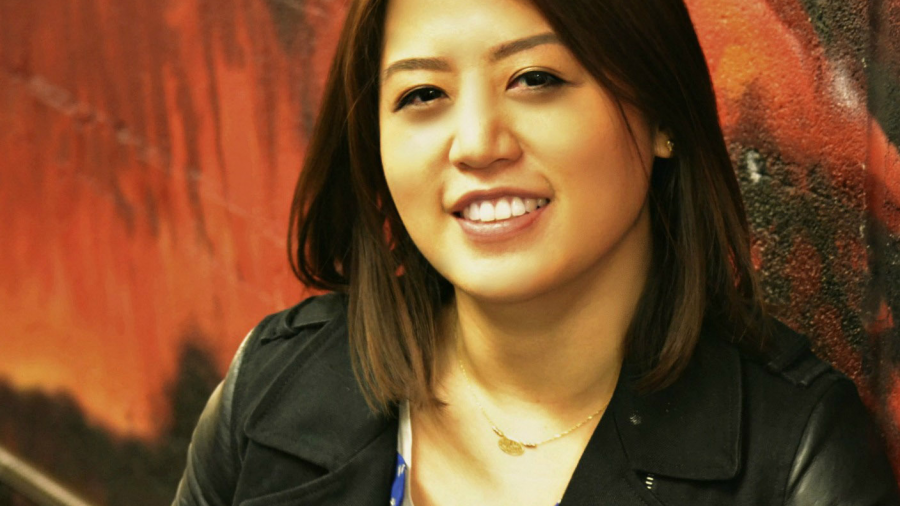By Cori Dioquino
Letter from the Editor:
When I first sat down to a Zoom chat with Cinder Chou in May, my goal was to publish her interview right at the start of June. Then, almost overnight, the world seemed to erupt. We hit pause.
I questioned whether or not it was still appropriate for anyone to talk about the arts, let alone entertainment and filmmaking during such a time as this. As the national conversations regarding racism, bias and systemic injustice continue, I realize more and more how big an impact the arts and entertainment industries have in our lives; how they both influence and reflect the ways in which we view, approach and interact with one another.
While reading through Cinder’s interview, I ask that you think about the representation you see in the films and TV shows that you watch. In what ways does the media that you consume feed and validate your own implicit biases? How can you help disrupt and restructure privilege and power in a world that is built on the backs and with the blood of slaves, natives and immigrants? How can we in this industry empower voices that have been silenced and erased throughout history?
We usually never think that what we do is enough to make a difference. Watching the deaths of George Floyd and Ahmaud Arbery on social media, reading about the murders of Breonna Taylor, Tony McDade, Nina Pop and Monika Diamond, and then witnessing all that has happened since has proven to me how our actions can impact, quite literally, the whole world; though I am willfully aware of how much further we have yet to go.
We all have roles that we choose to play, especially artists. I hope that, as you read this article, you reflect on how the roles you choose to play impact the world and change history.
Love and Respect,
Cori Dioquino
Managing Editor of Film Fest Magazine
———————————–
A Conversation with Cinder Chou: Writer, Director, Filmmaker
How did you get into filmmaking?
I grew up drawing and painting most of my life, and I was into graphic novels. Slowly, in high school, I got into film. My best friend was into film and I got into it because of him. I really liked how you could enter other worlds and see other perspectives. As an Asian American woman and as an LGBTQ person, I was looking for content that reflected my experience because it just wasn’t in mainstream media. I pursued [film] more when I went to study at Fordham University.
Why film? Why not just stick with art and graphic novels?
I saw the Princess and the Warrior. It was kind of a messed up fairy tale and I didn’t know that movies could be like that. I didn’t know they could reflect a reality that was so different than what I was experiencing. I started to think of the images I’d see in my head as more like stories rather than a still image or painting. It makes sense – art and graphic novels, they’re little story boards, basically.

How did you get into production coordinating?
I graduated in 2009, right after the last recession. I did a lot of day gigs and unpaid stuff. You try to meet as many people as possible and eventually it leads to paid work. I got a job as a director’s assistant, and then I was the production intern on a movie called Afterlife. I worked my way up and eventually became a production coordinator.
I switched over from production to accounting a couple of years ago, though. When I was coordinating, I was working 60-80 hours a week. It was so mentally taxing and it was really hard to find time to write. I think you have to work on your craft every day in order to improve. I tried the thing where I would work half the year, then not work half the year. It was too much. I never wanted to produce. I wanted to write and direct.
What projects were you working on before the shut downs?
I’m currently working on getting a feature off the ground. That’s been my main focus. I told myself, I’m gonna make [my feature] this year. I’m gonna set the day, I’m gonna make it September 2020. Now, it’s on pause.
The feature is inspired by my summer driving an ice cream truck. I was an Asian American lesbian trying to get the hell out of New Jersey and I got a job driving the ice cream truck [after high school].
I wanted to make a film where the Asian American, lesbian main character is existing as she would. When I grew up watching queer films, a lot of them ended in tragedy. I get it – tragedy allows people to empathize. But we also need to laugh too, which is why I want to make a comedy.
You don’t really see a lot of movies, even now, where Asian Americans are just being normal.
That’s why I really like Missus Softee – she’s driving around in an ice cream truck, which is so American. But she’s not what you imagine as the typical “American Dream”. She’s Asian American. She’s a lesbian.
The driving force of the movie is that she’s trying to find her community, trying to figure out how to be gay. It’s about coming out, trying to figure out the rules of attraction when you’re also trying to protect yourself.
Your films have kind of a quirky element to them. Like, What Happened to Susan.
That was based on a true story. I was the main character. I had roommates and they had some boundary issues. They would borrow my clothes [without my permission]. One day I was going to class and I was like, “Man, someone smells really bad on the train today…” Then, I get to class, take off my jacket and realize it’s me. [Someone wore my sweater and] my sweater hadn’t been washed. So that was the inspiration for that. I definitely draw on real life.

Still shot from THE MAN WITH THE WESTERN HAT.
What about The Man With The Western Hat?
That one was about me stalking people on the street. No, I’m just kidding.
I was really into watching Westerns at the time. It just kind of came to me while I was daydreaming – what would happen if you saw a real life cowboy on the street?
I wanted to see a woman who is obsessed with a cowboy, kind of sexually, but also because she has to be the hero of her own story. And you don’t really see female cowboys.
What ultimately makes you decide that you want to write a film about a particular experience?
If I can see the movie or scene in my head, then it’s worth pursuing.
For Missus Softee – when I took the job, I knew it would be a good story. I wasn’t interested in being an ice cream mogul. I just thought, “This might be an interesting story one day.”
So you became an ice cream truck driver so you could write about it one day?
Yeah, pretty much! I didn’t really have any other skill sets and it definitely seemed more interesting than washing dishes or retail. It actually prepared me for working in the film industry. It was low pay, long hours and you drive a lot.
How do you think the pandemic is going to change the film industry?
I think everything is going to become more expensive. I’m concerned about the indie film world. They don’t have the money to be able to buy tons of masks, gloves and hand sanitizer, or having a designated person for safety; that’s going to be a new position they’re talking about on bigger productions. I think indies will have to scale way down, more than they already have.
There’s a fear that work will go back to L.A. because they have the infrastructure. They have sound stages, they have hotel rooms on their studio lots. They can be on one unit. We don’t have that here in New York.

There’s a lot happening nationally regarding, not just the pandemic, but also systemic injustice and police brutality. In such a time, art tends to be the last thing on most people’s minds. How do you think the film industry can be supportive of the Black community right now?
We are seeing systemic injustice across the board, yes with police, and also in the film industry. We need to see true commitment to change and not the performative allyship that has become all too clear.
Change needs to start at the top, specifically at the studios and TV network level. Change cannot happen if we do not have leadership support and commitment. Producers and production companies should make it a top priority to hire Black professionals as department heads. We need Black storytellers to be the writers, directors, and showrunners; to be the decision makers. I have seen that people of color will hire people of color. Studios and networks can create and invest in trainee positions. Having visible programs sends the message to Black artists that there is space for you here. A good model is the Made in NY Production Assistant training program that trains individuals from diverse communities. I’d love to see this reflected on the crafts level with guilds and unions, too.
We cannot allow the excuse to continue that there aren’t Black and POC filmmakers with enough experience. This isn’t true. Actually, I see far less qualified White people given opportunities to write and direct over people of color. There is a lack of effort to find these storytellers, to provide mentorship and to put these voices at the forefront. That needs to change. This is just the beginning.

Still shot from MAN WITH THE WESTERN HAT.
What advice you would give young filmmakers who want to enter the film industry, particularly LGBTQIA+ fimmakers of color?
I advise filmmakers to write what they want to see in the world that they haven’t seen on screen previously. It’s a way of following your instincts and your unique tastes.
Following your instincts means listening to your subconscious, which is what makes you uniquely you. There is a story you are living that you have to uncover. I think all storytellers are writing two stories: there’s the plot and then there’s the meaning. Sometimes you don’t know what the story means or why you are telling it, but that’s what you have to find.
I had no idea what The Man with the Western Hat meant. I wrote the story of a young woman who finds a fictional cowboy living in real life. I didn’t know while writing the script that it was about a young woman who had to become the hero of her own story.
My only caveat is, if you’re thinking about writing a story about a nerd boy who gets the hottest girl in school, dig deeper.


